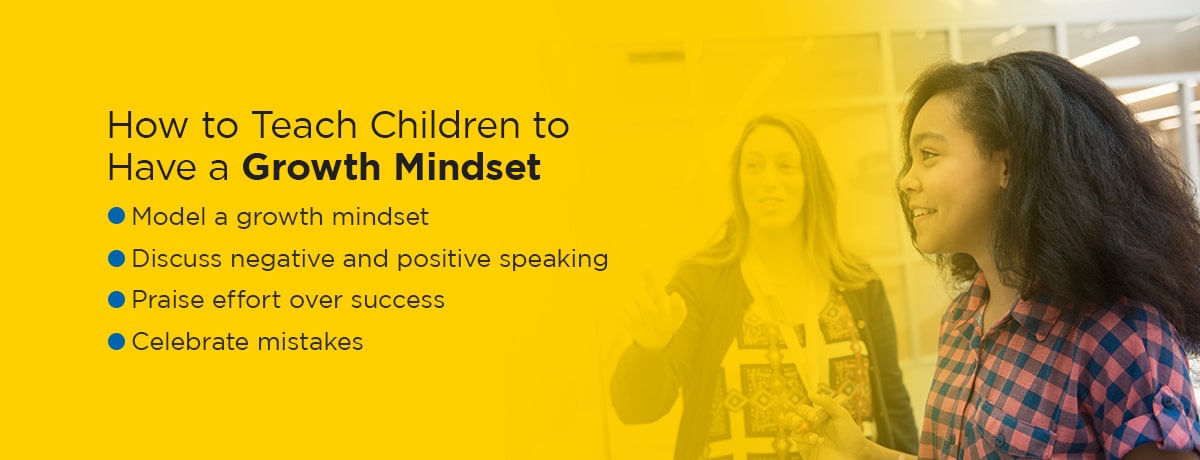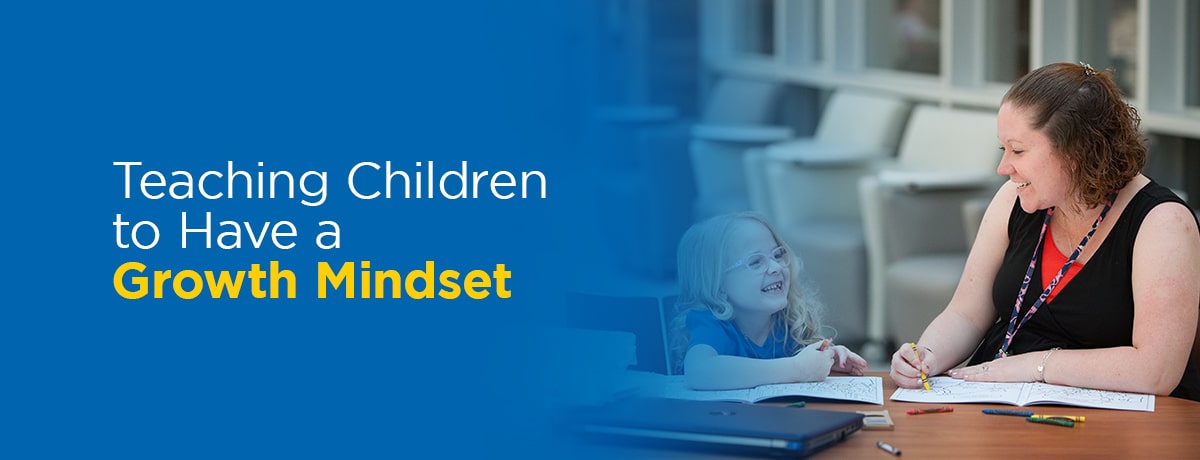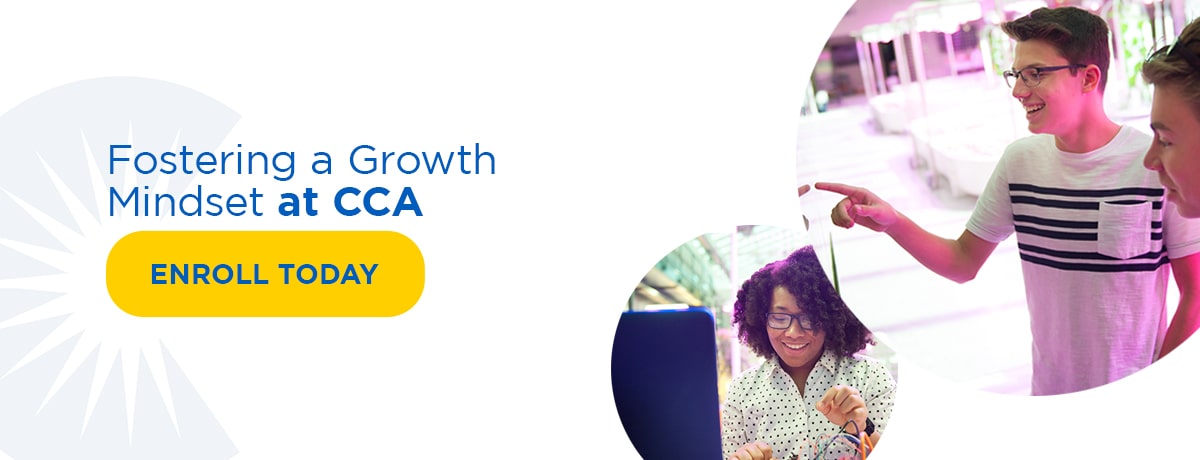If you find that your child is giving up easily or needs some help staying focused and determined, you can support them by nurturing a growth mindset. All you need is knowledge of different perspectives and the right techniques to put your child on the path to success.
What Is a Growth Mindset?
A child with a growth mindset believes their abilities are malleable and that they can achieve their goals through hard work and determination. They recognize that their talent is not set in stone, and instead, they can improve themselves with time and effort.
A growth mindset in children provides an abundance of benefits. Here are the two most significant advantages:
- Lifelong learning: Children with a growth mindset aren’t afraid of failure. They understand that life is a series of peaks and valleys, and there will be inevitable mistakes along the way. Viewing life in this way will make your child more willing to take chances at success.
- Higher self-esteem: Children will have more confidence and self-esteem as a result of a growth mindset. When they fail, they won’t say, “I’m just not good enough,” or, “I can’t do this.” They’ll recognize areas for improvement and use that the next time they face the problem.
Growth Mindsets Versus Fixed Mindsets
In a growth mindset, a child fosters an internal locus of control and will believe that they can positively impact activities or events they’re a part of. As a result, they continue to seek new ways to exert their influence and positively affect those around them. A child with a growth mindset:
- Embraces challenges
- Persists through setbacks
- Views effort positively
- Learns from criticism
- Finds lessons in the success of others
In a fixed mindset, a child believes that their talent is unchanging and predetermined and they link negative emotions to failure, leading to lower self-esteem. This belief creates a sense of apathy towards new challenges. If children face obstacles that prove difficult, they may believe they don’t measure up or aren’t good enough for the task. A child with a fixed mindset:
- Avoids challenges
- Gives up more easily
- Negatively views effort
- Ignores negative feedback
- Sees others’ successes as a threat
A fixed mindset puts your child at risk of closing themselves off from criticism and failure completely. Instill your child with the values of a growth mindset, coaxing them to learn through failure, feedback, and the success of others.

How to Teach Children to Have a Growth Mindset
Teaching kids about a growth mindset is one of the most rewarding things you can do as a parent. You will see them succeed through adversity and take on challenges with confidence. Knowing the fundamentals is one thing, but you could be wondering how to help your child get into a growth mindset. Here are some growth mindset tips for parents:
- Model a growth mindset: If your child sees you employing traits of a growth mindset, they’ll be more likely to use it themselves. You can model this behavior by talking through challenges aloud or telling them stories about times when you persevered and used effort and hard work to achieve something.
- Discuss negative and positive speaking: Try to identify when your child uses fixed-mindset language, such as, “It’s too hard,” or, “I’m not good enough.” Use that time as an opportunity to present new affirmations, like, “Just keep trying. You’ll get it,” or, “Be patient. You just need to keep working at it.” This tip is great for fostering a growth mindset for elementary students, as you can implement positive language early so they can carry it with them into the future.
- Praise effort over success: Sometimes a child will put forth a lot of effort and still not achieve success. Let them know that this is a part of life and praise them for giving it their best effort. Knowing you did your best is a reward in itself.
- Celebrate mistakes: Having a growth mindset is all about making mistakes and learning from them. When your child tries and fails at something new or complex, celebrate it and affirm that they can learn and grow from that opportunity.
At-Home Activities that Support a Growth Mindset in Children
Nurturing a growth mindset doesn’t have to be difficult or time-consuming. It can be simple, straightforward actions that accumulate to something more significant. Here are some fun activities that show you how to encourage a growth mindset in your child:
- Kindness week challenge: Kindness helps those around us and fosters a sense of betterment in ourselves. Have your child devote a week to keeping a journal of the kind acts they do for others. This could be complimenting someone, holding the door open for a classmate, or picking some litter off the sidewalk and throwing it away. At the end of the week, you can review those acts of kindness while praising your child for helping others.
- Accomplishment jar: Children are learning and accomplishing new things every day. Celebrate these successes by having your child write down each accomplishment or new thing learned on a small piece of paper. Put this paper in a jar or bowl and revisit it at the end of the week. Your child will marvel at all that they’ve learned and done, and they’ll be motivated to follow suit the following week.
- 3-2-1 exercise: The 3-2-1 exercise is simple — at the end of each week, ask your child about three things they’ve learned, two things they want to learn, and one question they still want answered.
What to Know About CCA’s Education Programs
Commonwealth Charter Academy is dedicated to fostering this growth mindset in children. We implement high standards paired with the flexibility unique to an online charter school. Our process goes beyond just a core curriculum — we give students the tools to succeed in life and the ability to achieve future careers.
Schooling runs from elementary through high school, and each grade is targeted at meeting students’ needs. Our diverse and flexible curriculum allows students to study what interests them at the time that fits their schedule. We foster an atmosphere dedicated to accepting mistakes, seeking out challenges, and building a growth mindset.
Fostering a Growth Mindset at CCA
Though teaching your child growth mindset techniques can positively impact and put your child on the right track, sometimes they need a more structured atmosphere where they can fully embrace this philosophy and test it out in an educational space. At CCA, we can offer this kind of space.
Give your child a unique, valuable education that emphasizes positive learning and growth above all else. With the room and ability to make mistakes and try out different subjects without fear of failure, they can grow as a person and student. Request more info today!




